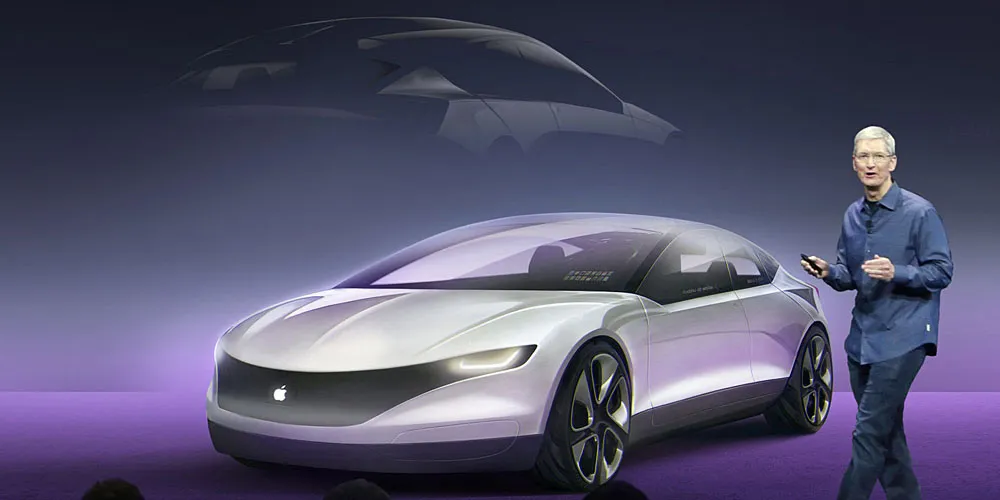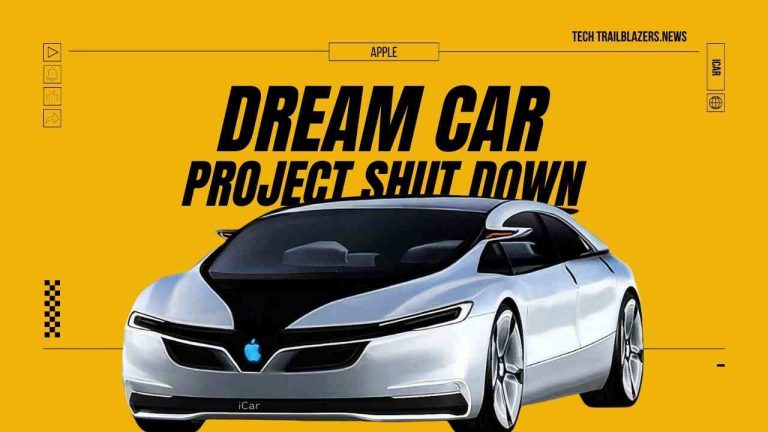Apple’s foray into the car industry, codenamed Project Titan, was shrouded in secrecy from the beginning. While details were scarce, rumors painted a picture of a revolutionary electric car (EV) packed with futuristic features. However, the project’s trajectory took several unexpected turns before ultimately being cancelled in February 2024.
The Dream: A Fully Autonomous Future
Early speculation suggested Apple envisioned a car that wouldn’t just be electric, but completely self-driving. This aligned with Apple’s expertise in software and AI, potentially leading to a seamless integration between car and user. Imagine a car that could handle commutes or road trips on its own, freeing up passengers’ time. Additionally, a focus on sleek design and user experience, hallmarks of Apple products, could have led to a unique in-car environment.

The Hurdles: Challenges on the Road
Developing a fully autonomous vehicle proved to be a much bigger challenge than anticipated. Technical hurdles like sensor limitations and complex regulations hampered progress. Additionally, safety concerns surrounding self-driving technology added pressure.
Project Titan also faced internal roadblocks. Leadership changes and shifting priorities within Apple led to course corrections. In 2022, reports suggested Apple was abandoning the fully autonomous dream, scaling back to focus on advanced driver-assistance features, similar to Tesla’s Autopilot.
The End of the Road: A Shift in Focus
Despite the scaled-back ambitions, Apple ultimately decided to pull the plug on Project Titan in February 2024. Resources were reportedly redirected towards other areas like artificial intelligence and augmented reality, where Apple might have a clearer path to success.
Apple’s Visionary Focus: Beyond the Car
While Apple’s car project may have been cut short, the company remains dedicated to innovation and exploration beyond its core products. Here are some of Apple’s alternative investments towards other visionary projects:
1. Augmented Reality (AR) and Virtual Reality (VR): Apple heavily invests in AR and VR technologies, evident through its ARKit framework for developers and the rumored development of a mixed reality headset. This technology has the potential to revolutionize various fields like gaming, healthcare, education, and even product design.
2. Artificial Intelligence (AI): Apple consistently invests in AI research and development, integrating it into existing products like Siri and Face ID. Further advancements in AI might lead to personalized user experiences, improved device functionalities, and even autonomous applications in future products.
3. Healthcare: Apple has made significant strides in the healthcare sector with products like the Apple Watch and its Health app. Investments in health research, medical device development, and partnerships with healthcare institutions point towards Apple’s vision of integrating technology seamlessly into personal health management.
4. Smart Homes and Connected Devices: Apple’s HomeKit platform and its investments in smart home technology showcase the company’s interest in creating a connected ecosystem of devices. This could involve seamless interaction between Apple devices and smart appliances, thermostats, and other home automation systems.
5. Sustainability and Environmental Initiatives: Apple has placed a strong emphasis on sustainability, investing in renewable energy sources for its data centers, using recycled materials in products, and developing energy-efficient devices. This commitment reflects a growing trend of companies addressing environmental concerns.
While Apple hasn’t officially disclosed specific sales targets for the Vision Pro, reports and analyst predictions offer some insights:
- Initial Sales Figures: Early reports in January 2024 indicated Apple selling over 200,000 Vision Pro units within the first 10 days of pre-orders, exceeding some analysts’ expectations.
- Analyst Predictions: Analysts like Ming-Chi Kuo initially predicted Apple could ship 500,000 units in 2024, while others projected a wider range of 200,000 to 1 million units.
- Long-Term Projections: Some reports claim Apple hopes to sell 12.6 million Vision Pro units within five years, potentially outselling competitors like Meta and Sony in the VR/AR market.
Furthermore, it’s still early to gauge the Vision Pro’s long-term success. While initial sales seem promising, factors like user reviews, competitor strategies, and overall market adoption will influence future sales performance.
Therefore, it remains uncertain whether Apple has achieved its specific sales goals for the Vision Pro. We’ll likely need to wait for further official data or market research to get a clearer picture of the headset’s long-term commercial success.
Tech Trailblazers
While Apple’s ambitious car project may not have reached the finish line, it serves as a reminder of the company’s constant pursuit of innovation. Their recent success with the Vision Pro headset, exceeding initial expectations, demonstrates their ability to adapt and thrive in new markets. With continued investments in areas like AR/VR, AI, and sustainable technologies, Apple positions itself as a frontrunner in shaping the future, even if the path sometimes takes unexpected turns. The company’s story highlights the importance of embracing calculated risks and learning from both triumphs and setbacks on the road to groundbreaking advancements.
Read more : Silicon Valley Experiments with Its Own Code: The Dogfooding Revolution of AI | Apple Vision Pro: A Gateway to a Spatial Revolution | Stepping into Infinity: Disney’s HoloTile Redefines Virtual Movement

